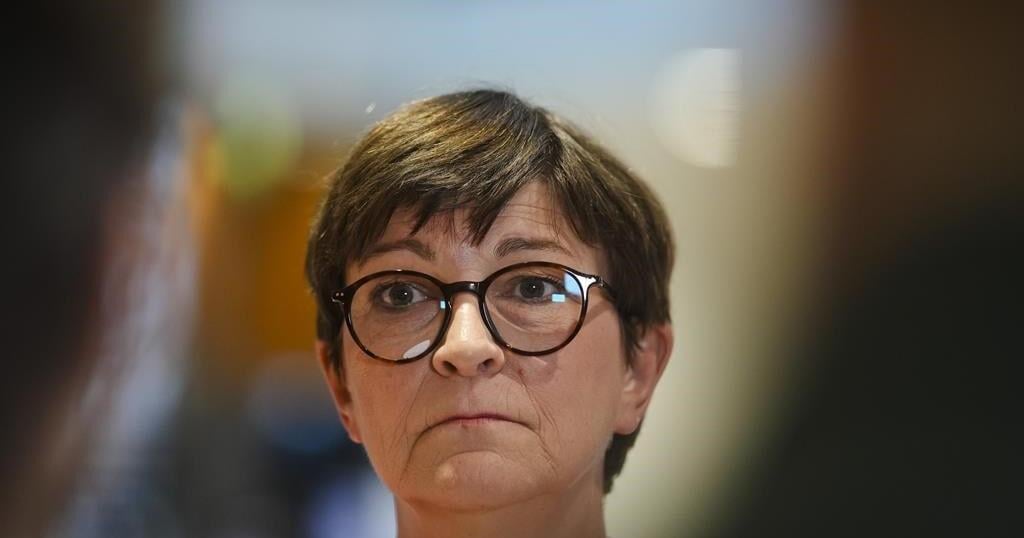BERLIN (AP) — The Alternative for Germany party’s success in two state elections piled new pressure on Chancellor Olaf Scholz’s fractious government and left the country’s conservative opposition facing political contortions on Monday to find a way to govern a pair of eastern regions without involving the far-right party.
Alternative for Germany, or AfD, became the first far-right party to win a state election in post-World War II Germany in Thuringia on Sunday under one of its hardest-right figures, Björn Höcke. In neighboring Saxony, it finished only just behind the mainstream center-right Christian Democratic Union, which leads the national opposition. Voters punished the three parties in Scholz’s governing coalition, which took well under 15% of the vote between them.
Deep discontent with a national government notorious for infighting, inflation and a weak economy, anti-immigration sentiment and skepticism toward German military aid for Ukraine are among the factors that contributed to support for populist parties in the formerly communist east, which is less prosperous than western Germany. A new party founded by a prominent leftist was the second big winner on Sunday — and will probably be needed to form state governments since no one is prepared to govern with AfD.
The debacle for the governing parties added to awful performances in the European Parliament election in June for Scholz’s coalition, and it’s not obvious that they have any recipe to rebound with Germany’s next national election due in a bit over a year. Another state election on Sept. 22 in an eastern region — Brandenburg, which unlike the two that voted Sunday is currently led by Scholz’s center-left Social Democrats — could add to their embarrassment.
Voters “wanted to send a signal to Berlin above all,” Jens Spahn, a senior CDU lawmaker, told ZDF television. “They want to send a signal to the (coalition) that the chancellor no longer has their confidence. Olaf Scholz is the face of failure in Thuringia and Saxony too.”
One of the leaders of Scholz’s party, Saskia Esken, insisted that “Olaf Scholz is our strong chancellor and he will be our strong candidate for chancellor.”
“We turned things around in the final months in the last national election, and we will succeed again this time,” she said. “And I want to say very clearly that all the (coalition) parties, but in particular our two coalition partners, must take the motivation from this election result to end these public arguments and pull together.”
Chances of that didn’t look good Monday as each party insisted on its own policy priorities. Ricarda Lang, a co-leader of the environmentalist Greens, acknowledged that voters are sick of hearing politicians say the coalition must improve its act, “so I’m not going to make false promises here.”
Scholz wrote on Instagram that Sunday’s results are “bitter” and that “our country cannot and must not get used” to such AfD victories. He also argued that “bleak forecasts” for his own party had not been fulfilled — drawing derision from opposition conservatives. “All democratic parties are now called on to form stable governments without right-wing extremists,” Scholz said.
That will be a matter primarily for the CDU, which also leads national polls. AfD holds now more than a third of the seats in Thuringia’s state legislature — which would, for example, allow it to block appointments of judges to the regional constitutional court — and is close to that level in Saxony. That will make it hard to build workable governments.
AfD’s national co-leader, Alice Weidel, renewed the party’s call to its opponents not to freeze it out. “Firewalls are undemocratic,” she said.
AfD’s strength in the east pushed other parties into unconventional coalitions as long ago as 2016, but Sunday’s results took that to a new level.
In Thuringia, even a previously improbable combination of the CDU, Scholz’s party and the new Sahra Wagenknecht Alliance, which combines left-wing economic policy with an immigration-skeptic stance and opposition to military aid for Ukraine, lacks a majority. To get one, the conservatives would also need help from the Left Party, which is descended from East Germany’s communist rulers and led the outgoing state government. So far, they have refused to work with it.

























